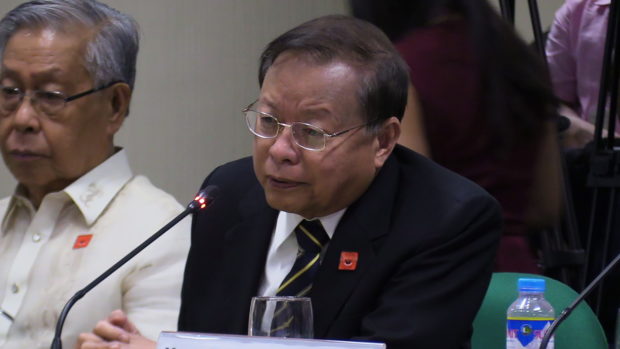Puno body sees bicameral Congress

Reynato Puno, Former Chief Justice of the Supreme Court of the Philippines. INQUIRER.net / CATHY MIRANDA
The consultative committee created by President Rodrigo Duterte to review the 1987 Constitution has initially agreed to retain a bicameral legislature under a presidential-federal system of government.
The decision was reached during a caucus on Monday by the committee chaired by former Supreme Court Chief Justice Reynato Puno.
In a statement, the committee said the composition, manner of election of members, powers and other details about the legislature were “still for further deliberation.”
“So we agreed on a bicameral Congress, but it is not yet final,” said committee member and former Supreme Court Justice Antonio Eduardo Nachura.
Qualifications
Article continues after this advertisementThe committee agreed to devote the rest of the week to deliberations on distribution of powers among the executive, legislative and judicial branches of government.
Article continues after this advertisementResults of the deliberations would be voted upon on Monday.
Former Sen. Aquilino “Nene” Pimentel Jr., a committee member, said the body was now identifying what powers would be exercised by the President, Congress and judiciary. “We are now putting the details,” he said.
One of the issues “most discussed,” said Pimentel, was whether the current qualifications for becoming President were sufficient.
Under the 1987 Constitution, a candidate for President must be a natural-born Filipino, registered voter, able to read and write, at least 40 years old on the day of the election and must have lived in the Philippines for 10 consecutive years immediately prior to the election.
The committee is deliberating whether to require candidates for President to be college graduates. The same requirement was being proposed for members of the legislature.
Dropouts
Pimentel and another committee member, Eddie Mapag Alih, supported the additional qualification, saying that the position of President required a minimum level of education.
But lawyer Roan Libarios, former president of the Integrated Bar of the Philippines, said some accomplished individuals and known political leaders were school dropouts, including some who became senators and members of the Cabinet.
He did not mention names but former actor Joseph Estrada became senator and President although unable to finish college.